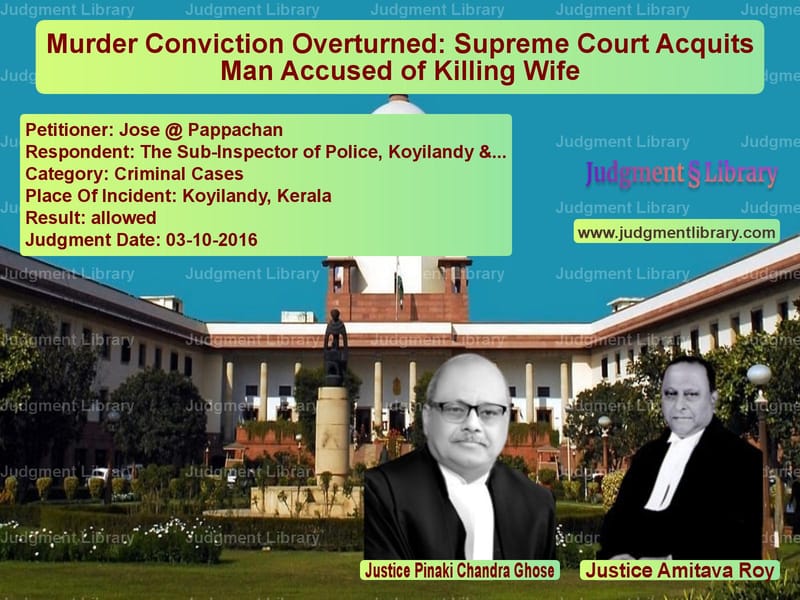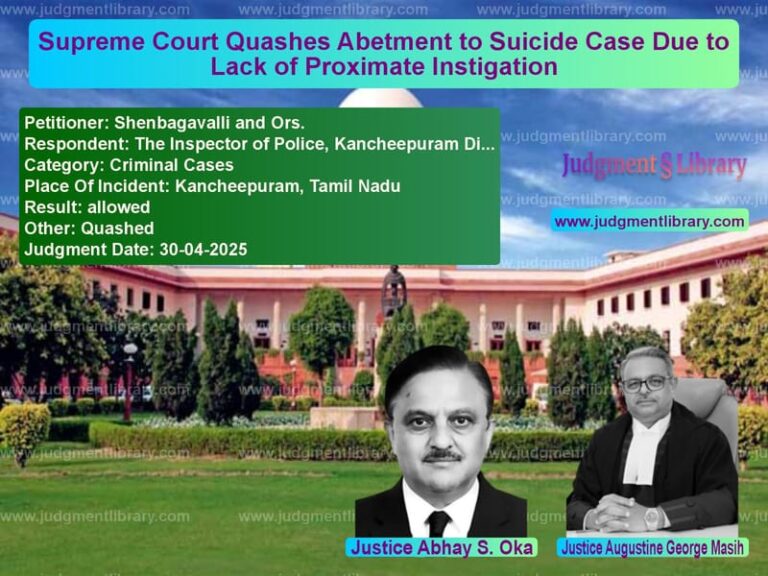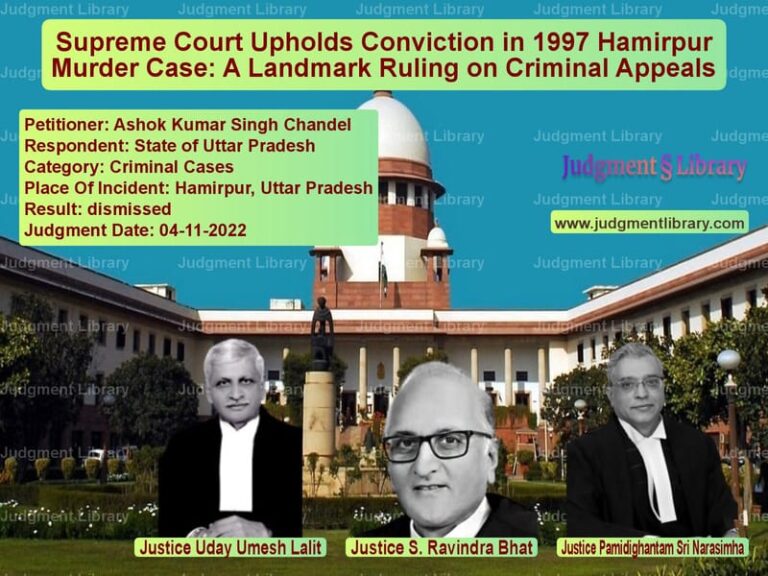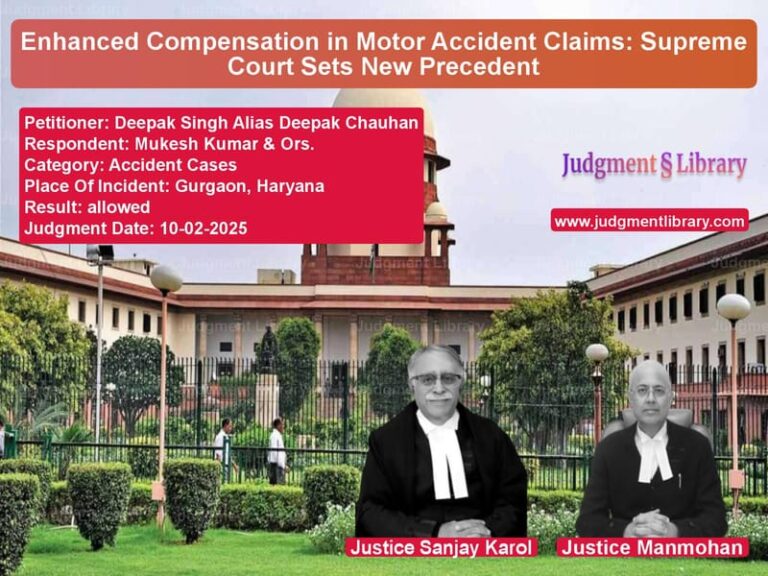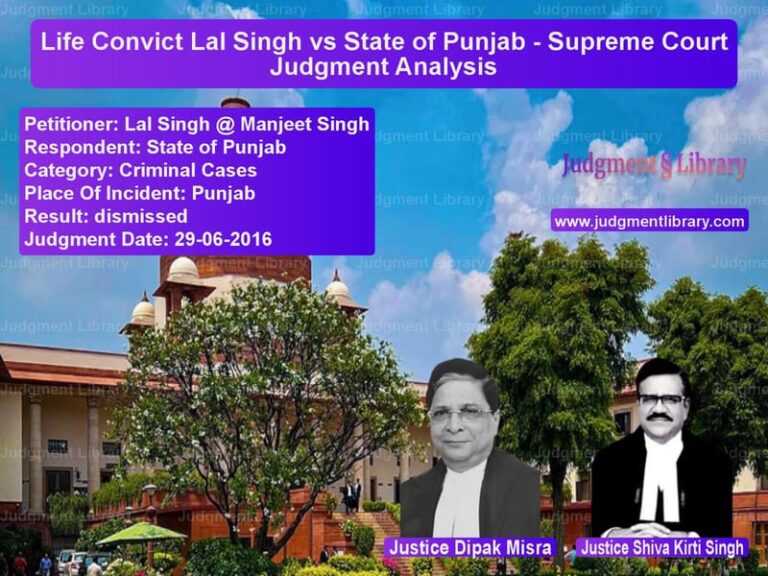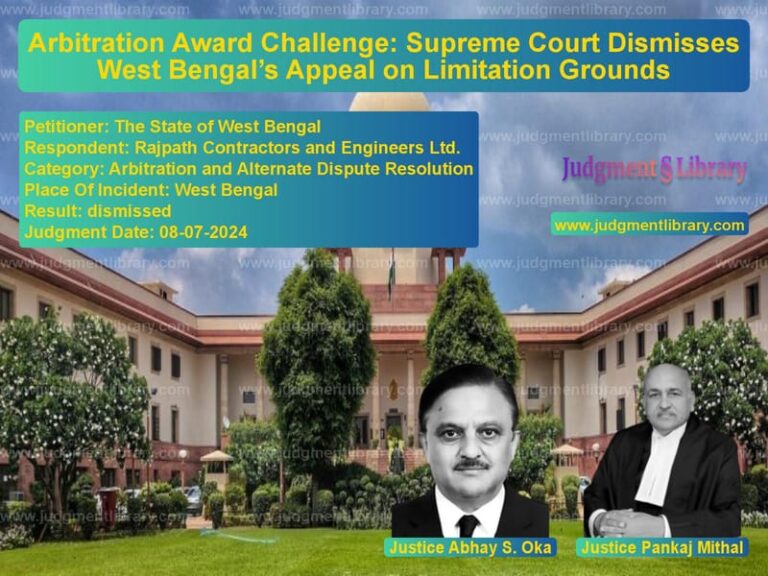Murder Conviction Overturned: Supreme Court Acquits Man Accused of Killing Wife
The Supreme Court of India, in the case of Jose @ Pappachan v. The Sub-Inspector of Police, Koyilandy & Another, delivered a crucial judgment on October 3, 2016, addressing the principles of circumstantial evidence in a murder trial. The case involved the appellant, Jose @ Pappachan, who was convicted by the trial court under Section 302 of the Indian Penal Code (IPC) for allegedly murdering his wife, Neena. The conviction was upheld by the High Court, and the appellant approached the Supreme Court seeking relief.
The Supreme Court, after thoroughly examining the evidence, overturned the conviction, emphasizing that suspicion, however strong, cannot replace legal proof. The ruling reiterates the legal standards required to establish guilt in cases based on circumstantial evidence.
Background of the Case
The case arose from an alleged incident that took place on September 19, 2000. The appellant, a former police constable, was accused of murdering his wife, Neena, by smothering and strangulating her, and later attempting to pass it off as a suicide by hanging her body. The prosecution claimed that the murder was committed due to the appellant’s extramarital affair with a woman named Darly, whom he later married.
The prosecution’s case relied heavily on circumstantial evidence, as there were no direct witnesses to the crime. The trial court convicted the appellant, and the High Court upheld the decision. The Supreme Court, however, found that the evidence presented was insufficient to establish guilt beyond a reasonable doubt.
Arguments Presented
Prosecution’s Case
- The appellant had an illicit relationship with Darly and wanted to eliminate Neena to legitimize his new relationship.
- He had resigned from the police force and moved to Saudi Arabia, allegedly living there with Darly as his wife.
- The appellant was the last person seen with Neena before she was found dead in their home.
- The post-mortem report indicated that Neena had injuries suggesting smothering and strangulation before hanging.
- The presence of a plastic rope under the cot and broken bangles suggested a struggle.
- The appellant’s conduct was suspicious; he did not immediately rush to Neena’s aid when informed of her critical condition.
Defense Arguments
- The appellant maintained that Neena had committed suicide and that he had no role in her death.
- He had gone in search of laborers on the evening of the incident and was not present at home when the alleged crime occurred.
- His son, Akhil, testified that the relationship between his parents was cordial and that his father had no reason to kill Neena.
- The first information report (FIR) and early witness statements supported the theory of suicide, and later prosecution attempts to alter witness testimonies were unreliable.
- The post-mortem report did not conclusively state whether the death was a result of homicidal or suicidal hanging.
Supreme Court’s Judgment
The Supreme Court examined the circumstantial evidence and found that it did not establish guilt beyond reasonable doubt. The key observations made by the Court included:
- On Circumstantial Evidence: The Court reiterated that in cases based solely on circumstantial evidence, the prosecution must establish a complete chain of evidence leading to the only conclusion that the accused is guilty.
- On the Post-Mortem Report: The medical evidence was inconclusive as to whether the death was a suicide or a homicide.
- On the Witness Testimonies: Several key witnesses changed their statements years after the incident, raising doubts about the credibility of their testimonies.
- On the Conduct of the Appellant: While the appellant’s conduct may have seemed unusual, it was not sufficient to convict him without concrete evidence.
The Court, citing precedents, stated: “Suspicion, however grave, cannot take the place of proof. The prosecution in order to succeed on a criminal charge cannot afford to lodge its case in the realm of ‘may be true’ but has to essentially elevate it to the grade of ‘must be true.’”
Legal Precedents Cited
The Court referred to key judgments that set the standard for conviction based on circumstantial evidence:
- Sharad Birdhichand Sarda v. State of Maharashtra (1984) 4 SCC 116: This case established that the prosecution must prove guilt beyond reasonable doubt with a complete chain of circumstantial evidence.
- Sujit Biswas v. State of Assam (2013) 12 SCC 406: The Court held that circumstantial evidence must lead to the only possible conclusion that the accused is guilty.
- Dhan Raj v. State of Haryana (2014) 6 SCC 745: It was emphasized that circumstantial evidence must be of the highest order to warrant conviction.
Impact of the Judgment
This judgment is significant in reinforcing the principle that conviction in criminal cases must be based on clear and convincing evidence. The Supreme Court’s ruling prevents miscarriages of justice in cases where the prosecution’s case relies solely on circumstantial evidence without eliminating all possible alternative explanations.
The acquittal of the appellant underscores the necessity of adhering to due process and ensuring that personal biases and assumptions do not influence judicial decisions. The ruling also highlights the importance of timely and consistent witness testimonies in criminal trials.
Conclusion
The Supreme Court’s verdict in Jose @ Pappachan v. The Sub-Inspector of Police, Koyilandy & Another serves as an important precedent in criminal law, emphasizing the need for conclusive evidence in murder cases. By overturning the conviction based on circumstantial evidence, the Court has reaffirmed the principle that every accused is presumed innocent until proven guilty beyond reasonable doubt.
This case also highlights the risks associated with wrongful convictions and the responsibility of courts to critically assess evidence before delivering a verdict. The Supreme Court’s ruling ensures that justice is served fairly and impartially, protecting the rights of individuals against wrongful prosecution.
Don’t miss out on the full details! Download the complete judgment in PDF format below and gain valuable insights instantly!
Download Judgment: Jose @ Pappachan vs The Sub-Inspector of Supreme Court of India Judgment Dated 03-10-2016.pdf
Direct Downlaod Judgment: Direct downlaod this Judgment
See all petitions in Murder Cases
See all petitions in Bail and Anticipatory Bail
See all petitions in Fraud and Forgery
See all petitions in Judgment by Pinaki Chandra Ghose
See all petitions in Judgment by Amitava Roy
See all petitions in allowed
See all petitions in supreme court of India judgments October 2016
See all petitions in 2016 judgments
See all posts in Criminal Cases Category
See all allowed petitions in Criminal Cases Category
See all Dismissed petitions in Criminal Cases Category
See all partially allowed petitions in Criminal Cases Category

